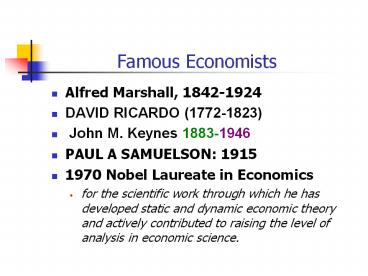Famous Economists PowerPoint PPT Presentation
1 / 16
Title: Famous Economists
1
Famous Economists
- Alfred Marshall, 1842-1924
- DAVID RICARDO (1772-1823)
- John M. Keynes 1883-1946
- PAUL A SAMUELSON 1915
- 1970 Nobel Laureate in Economics
- for the scientific work through which he has
developed static and dynamic economic theory and
actively contributed to raising the level of
analysis in economic science.
2
Great Economists
- Adam Smith (1772-1791)
- David Ricardo (1772-1823)
- Thomas Malthus (1766-1834)
- John Stuart Mill (1806-1873)
3
Great Economists
- 1850
- Karl Marx (1818-1883)
- Marxist School
- Leon Walras (1834-1910)
- Alfred Marshall (1842-1924)
4
Great Economists
- Thorstein Veblen (1857-1929)
- Institutionalist Economics
- John Keynes (1883-1946)
- Keynesian School
- Irving Fisher (1867-1947)
5
Mercantilists
- Mercantilism was the economic philosophy adopted
by merchants and statesmen during the 16th and
17th centuries. Mercantilists believed that a
nation's wealth came primarily from the
accumulation of gold and silver. Nations without
mines could obtain gold and silver only by
selling more goods than they bought from abroad.
6
Mercantilists2
- Accordingly, the leaders of those nations
intervened extensively in the market, imposing
tariffs on foreign goods to restrict import
trade, and granting subsidies to improve export
prospects for domestic goods. Mercantilism
represented the elevation of commercial interests
to the level of national policy.
7
Physiocrats
- Physiocrats, a group of 18th century French
philosophers, developed the idea of the economy
as a circular flow of income and output. They
opposed the Mercantilist policy of promoting
trade at the expense of agriculture because they
believed that agriculture was the sole source of
wealth in an economy.
8
Physiocrats
- As a reaction against the Mercantilists' copious
trade regulations, the Physiocrats advocated a
policy of laissez-faire, which called for minimal
government interference in the economy.
9
The Classical School
- The Classical School of economic theory began
with the publication in 1776 of Adam Smith's
monumental work, The Wealth of Nations. The book
identified land, labor, and capital as the three
factors of production and the major contributors
to a nation's wealth. In Smith's view, the ideal
economy is a self-regulating market system that
automatically satisfies the economic needs of the
populace.
10
The Classical School 2
- He described the market mechanism as an
"invisible hand" that leads all individuals, in
pursuit of their own self-interests, to produce
the greatest benefit for society as a whole.
Smith incorporated some of the Physiocrats'
ideas, including laissez-faire, into his own
economic theories, but rejected the idea that
only agriculture was productive.
11
David Ricardo
- While Adam Smith emphasized the production of
income, David Ricardo focused on the distribution
of income among landowners, workers, and
capitalists. Ricardo saw a conflict between
landowners on the one hand and labor and capital
on the other. He posited that the growth of
population and capital, pressing against a fixed
supply of land, pushes up rents and holds down
wages and profits
12
Thomas Robert Malthus
- Thomas Robert Malthus used the idea of
diminishing returns to explain low living
standards. Population, he argued, tended to
increase geometrically, outstripping the
production of food, which increased
arithmetically. The force of a rapidly growing
population against a limited amount of land meant
diminishing returns to labor.
13
Thomas Robert Malthus
- The result, he claimed, was chronically low
wages, which prevented the standard of living for
most of the population from rising above the
subsistence level. He blamed unemployment upon
the economy's tendency to limit its spending by
saving too much, a theme that lay forgotten until
John Maynard Keynes revived it in the 1930s.
14
Marxist School
- The Marxist School challenged the foundations of
Classical theory. Writing during the mid-19th
century, Karl Marx saw capitalism as an
evolutionary phase in economic development. He
believed that capitalism would ultimately destroy
itself and be succeeded by a world without
private property.
15
Marxist School 2
- Marx believed that all production belongs to
labor because workers produce all value within
society. He believed that the market system
allows capitalists, the owners of machinery and
factories, to exploit workers by denying them a
fair share of what they produce.
16
Marxist School 3
- Marx predicted that capitalism would produce
growing misery for workers as competition for
profit led capitalists to adopt labor-saving
machinery, creating a "reserve army of the
unemployed" who would eventually rise up and
seize the means of production.

